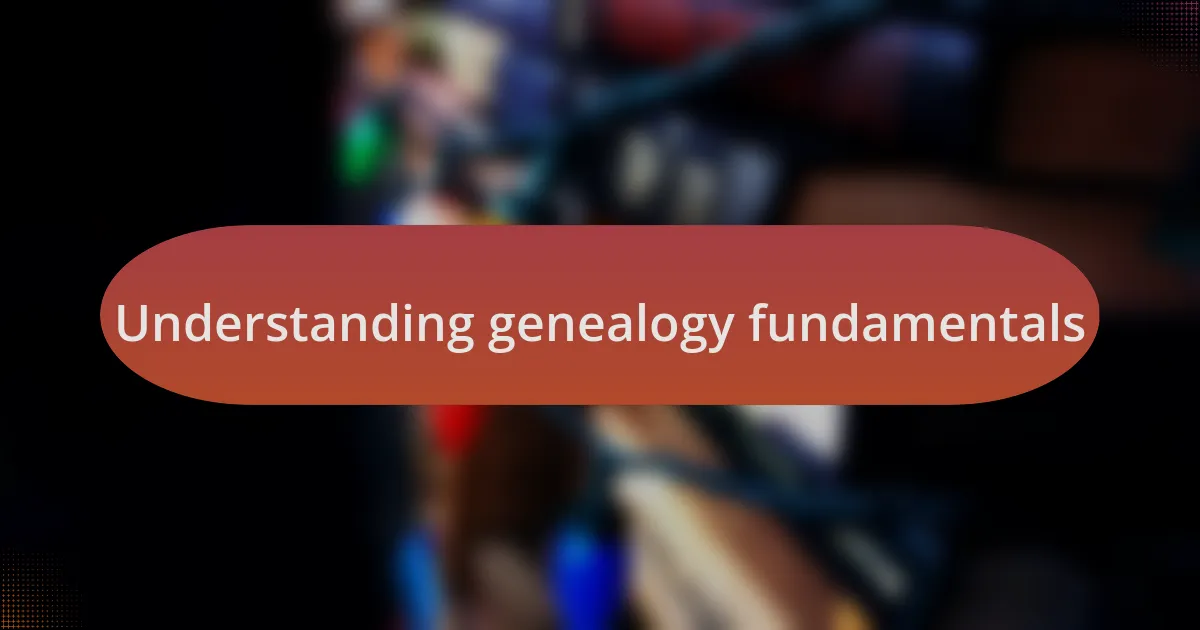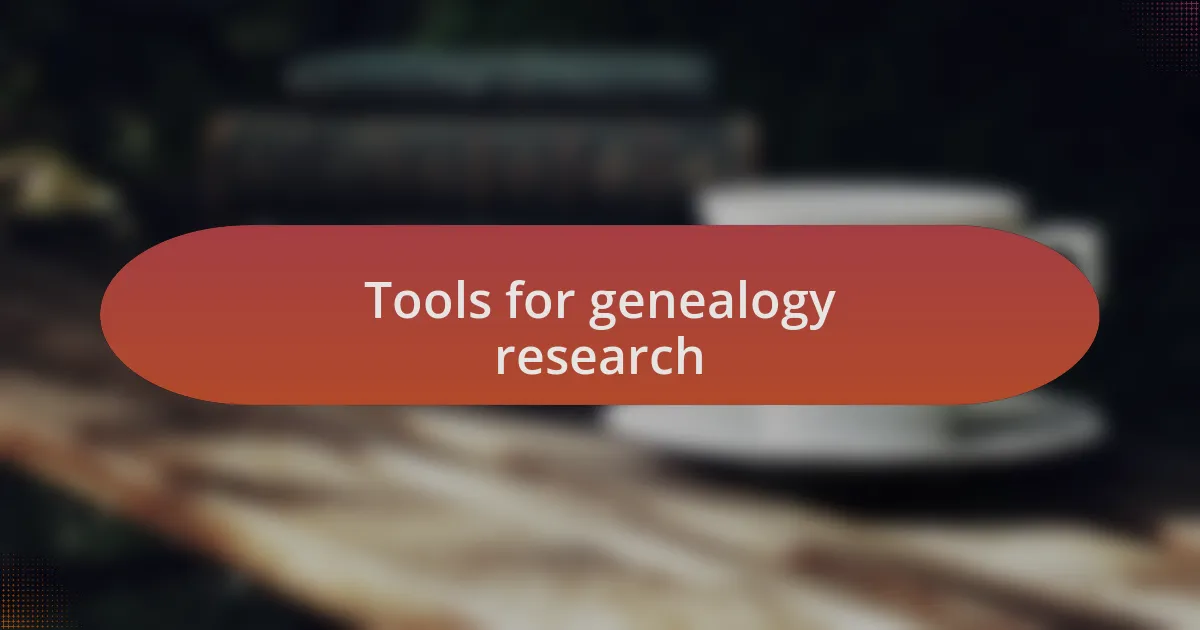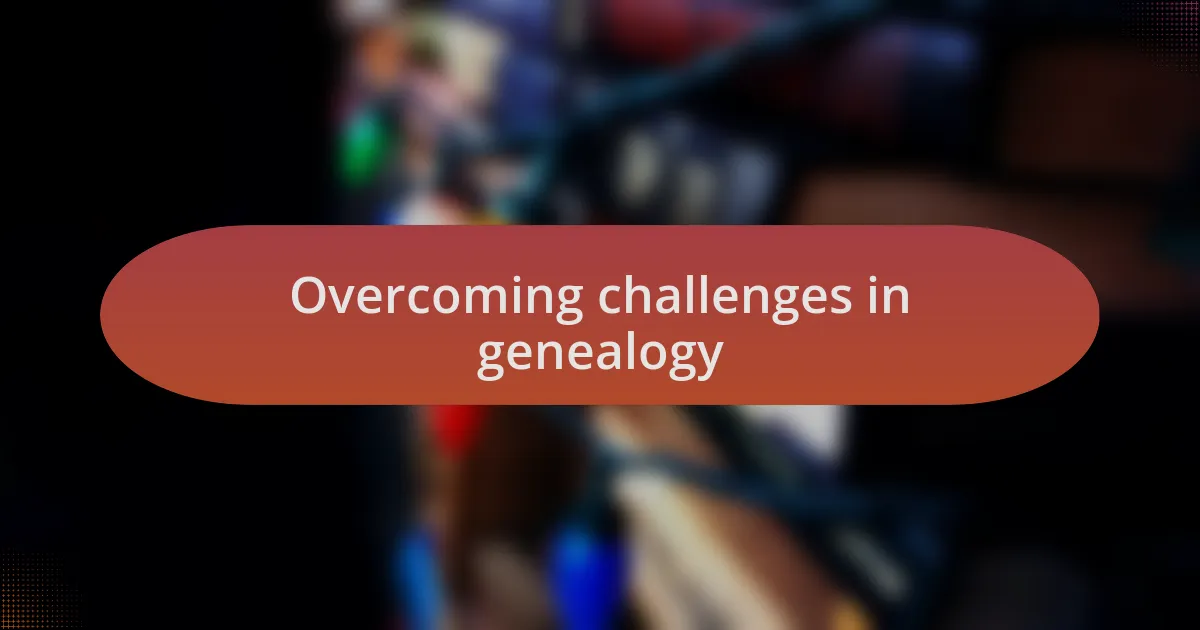Key takeaways:
- Genealogy involves understanding lineage and the significance of family connections beyond direct bloodlines, including extended families and friendships.
- Documenting family history through records like birth certificates and photographs is crucial as each piece offers insights into ancestors’ lives and experiences.
- Utilizing tools such as online databases, genealogy software, and local societies can streamline research and uncover valuable resources and community connections.
- Overcoming challenges in genealogy requires collaboration, perseverance, and emotional resilience, as exploring family histories can reveal both struggles and strengths.

Understanding genealogy fundamentals
Genealogy is more than just collecting names and dates; it’s about uncovering the stories that define who we are. When I first started my journey, I was amazed at how a simple name could evoke emotions and memories from generations ago. Have you ever wondered what life was like for your ancestors? The answers can be profound and transformative, often revealing unexpected connections to history.
At the heart of genealogy lies a fundamental understanding of lineage, or how families are connected over time. This isn’t merely about direct bloodlines; consider the impact of extended families, adoptions, or even close friends who became part of your family tree. I remember tracing my great-grandmother’s life and realizing she was not just my ancestor but a central figure in shaping our family’s narrative. This perspective can dramatically change how you view your own place within your family history.
One key aspect of genealogy is the importance of documentation. The thrill of finding an old birth certificate or a faded photograph can be exhilarating and, frankly, emotional. Every piece you uncover serves as a puzzle piece in your family’s history. How often do we overlook the significance of these documents? Each records not just facts, but the lives and experiences of those who came before us, enriching our understanding and appreciation of our heritage.

Tools for genealogy research
When starting my genealogy journey, I quickly discovered that various tools could significantly streamline my research. Online databases, like Ancestry.com and FamilySearch, provided me with access to millions of records, from census data to military enlistments. Have you ever felt overwhelmed by the vastness of available information? I certainly did, but these platforms offered search filters that helped me focus on specific family branches and made the task much more manageable.
Another invaluable resource in my toolkit has been genealogy software. Programs such as Legacy or Gramps allow me to organize and visualize my findings effectively. I can create family trees, note important dates, and even attach documents and images. Have you considered how important organization is in your research? Without these tools, I might have lost track of the intricate details, like my grandfather’s emigration records, which turned out to be a key to understanding my family’s past.
In my experience, joining local genealogy societies has also been incredibly fulfilling. These groups often host workshops and offer access to archival resources that you can’t find online. One memorable workshop I attended introduced me to local historical records related to my surname, leading to a breakthrough that connected my family to a community I had never known about. Have you tapped into the wealth of knowledge in your local area? Engaging with others who share your passion can open new doors to your genealogy research and uncover stories you might have missed.

Overcoming challenges in genealogy
Encountering obstacles in genealogy is almost a rite of passage for anyone delving into their family history. For example, I once hit a wall when trying to trace my great-grandmother’s origins. I had only her name and a rough estimate of her birth year. It felt like I was grasping at shadows. I reached out to distant relatives and suddenly, their stories and shared documents helped illuminate forgotten details, proving that collaboration can be a powerful tool in overcoming genealogical hurdles.
Technical challenges can also arise when dealing with historical documents that are not easily accessible or well-preserved. I remember sifting through faded microfilm records in my local library. At first, the task was frustrating; the handwriting was nearly indecipherable, and I grew weary. But then I stumbled upon a helpful online community that shared tips on deciphering old scripts and identifying common abbreviations. Their guidance turned a daunting experience into an enjoyable puzzle, reinforcing my belief that perseverance pays off in genealogy.
Sometimes, emotional challenges can be just as pronounced as the logistical ones. I found myself grappling with secrets that emerged from my family’s past, stories of struggle, and resilience that were not easy to digest. But examining these narratives allowed me to connect deeper with my roots. Have you ever considered how understanding a challenging family history can bring a new perspective to your own life? I discovered that facing these stories head-on fostered a sense of strength and pride in my family’s journey, making the quest for knowledge worthwhile beyond measure.